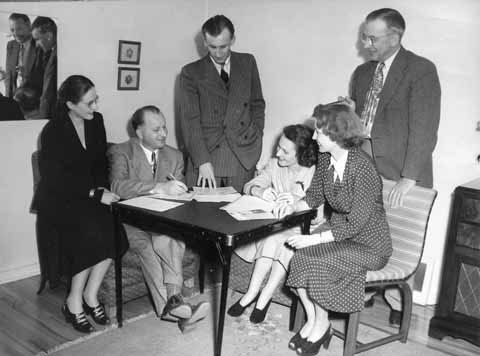The Yorkton Film Festival kicked off a new series of public screenings last week with Ebola War: The Nurses of Gulu.
The idea behind the series is “Spotlight on the News.”
“We wanted to create a place where people could come together and talk about some of the issues that are happening, even if they aren’t directly affecting our community,” said Randy Goulden, executive director of the Festival.
“And working with Kathy Morrell, our outreach coordinator, we hit on the idea of showing films that went behind the headlines and could help provide a better idea and context of some of the events that are making news headlines across the world.”
Around a dozen people showed up Thursday afternoon at Godfrey Dean Cultural Centre to view the documentary that chronicles the October 2000 Ebola outbreak in Uganda that killed 245 people including 12 nurses and one doctor.
Although the film is 14 years old, and the outbreak was tiny compared to the epidemic in west Africa right now, it provides stunning insight into the medical, logistical, psychological and sociological challenges in dealing with the deadly disease.
Goulden explained the new series highlights the year-round work the festival does and is in keeping with the tradition of the very earliest roots of the Yorkton Film Society. In addition to public screenings, the Film Festival works with various public, non-profit and even private organizations loaning out pertinent videos from its extensive collection to those organization’s missions.
As an example, she cited Corrections Canada, which had just picked up a number of films to show to its inmates.
Maintaining relevancy throughout all the many changes in society and technology over the past 67 years is a tribute to the hard work and dedication of generations of volunteers. In 1947, dissemination of information was obviously much different than it is today. Radio was widespread, but television was in its infancy with its use concentrated in the larger border cities where large rooftop antennae and amplifiers were capable of picking up American stations.
It was not until 1952 that the first Canadian stations, Montreal’s CBFT and Toronto’s CBLT started broadcasting and not until the late fifties, early sixties that the nationwide networks were well established everywhere.
What we did have before that was the National Film Board (NFB). Founded in 1939, as basically a propaganda machine for the federal government during World War II, the NFB evolved into a very important distributor of educational films with a mandate of disseminating motion pictures as widely as possible.
Cities were well-positioned with the films generally screened in commercial theatres. Many rural communities, however, did not even have a projector, much less a theatre. The NFB employed rural projectionists, who would make the rounds of set territories with projectors and the latest selections of NFB offerings.
The Board also encouraged communities to set up their own film councils. If a local council was able to raise the funds to buy a projector and train volunteers to run it, the NFB would provide maintenance and insurance on the equipment and, of course, a library of movies on a rotating basis.
So it was in March of 1947 a group of local service organizations set up a temporary film council to take advantage of the NFB’s offering.
The March 26 edition of The Enterprise chronicled the inaugural meeting of the Yorkton Film Council at which J. Otto Thorliefson—then president of the local Kinsmen Club that had convened the group—was elected chair.
“The purpose of a film council, it was pointed out, was community service and no profit was to be made from the venture at all,” the article stated. “In some cases small fees might be charged to offset expenses. Organizations requesting a special film for showing would have to pay the express on that film for example.”
At that meeting, the represented organizations committed $500 of the approximately $850 required for the equipment.
Within weeks, the remaining $350 was collected and the council started advertising for projectionists. By June 9 the film service was ready to officially launch with a special screening at City Hall. Mayor Charles Peaker spoke at the opening.
From the June 12, 1947 Enterprise: “[The mayor] was sure that documentary films would bring home facts to young people that might otherwise be hard to credit. The service would be very useful in adult education, the Mayor [sic] said.”
That original council was so active and the service was so popular, Yorkton earned the right to host the first international film festival ever held in western Canada in 1950. In fact, according to Wikipedia, it was first and remains the longest running short film festival in North America.
From the September 25, 1950 edition of The Enterprise:
“As early as last March the members began to make plans for this unusual event, and Yorkton was chosen as the logical place to hold such a festival because there is more interest shown in films and film council work here than in any other part of the province.”
It was a big deal then, with 60 documentaries from Canada, England, France, Denmark, Norway, Switzerland, India, Brazil, United States and Australia.
It was a heady time in the world of film, with great expectations for the medium. E.F. Holliday, then the commissioner of the Saskatchewan Film Board addressed the opening of the festival on October 11, 1950.
“Mr. Holliday is firmly convinced that the use of educational films in the world today, acquainting countries with the problems concerning one another, is a medium through which can be built a lasting peace,” The Enterprise reported.
No doubt, Mr. Holliday would be disappointed in the progress on that front, but the original council would surely be proud that the film service has survived and continues to be a going concern.




